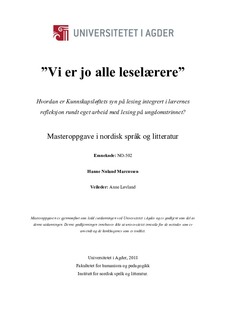| dc.description.abstract | The autumn of 2006, a new curriculum, "Kunnskapsløftet", was published, and as a result the
fundamental abilities were engraved. It was emphasized that basic abilities should be
integrated, and act as a supportive element in all subjects from primary and lower secondary
school to the upper secondary education. Reading was one of these abilities, combined with
writing, calculation, orality and digital competence. Following the introduction, a number of
research work has been conducted, which has focused on the implementation of the basic
abilities and "Kunnskapsløftet". Most reports have presented surprising and gloomy
conclusions – the implementation of the basic abilities have not turned out according to the
intensions in "Kunnskapsløftet" (Dale et al. 2009, Hodgson et al 2010, Aasen et al. 2012,
Udir, 2009).
In the present master thesis, I aim my focus on teachers and reading, with the following thesis
question:
How is "Kunnskapsløftets" perspective of reading integrated in the teacher's reflection
of his own work with reading at the youth stage?
The thesis question is concretized through the following research questions:
-‐ How does the teacher understand and interpret the mandate as reading teacher in
"Kunnskapsløftet"?
-‐ What actions have they attached to the mandate as reading teachers in
"Kunnskapsløftet"?
-‐ How has the mandate as reading teacher changed the teacher's teaching practice?
-‐ Is there a connection between the teacher's gender, subjects, educational background
and experience, and how they interpret, and practice their reading teacher's mandate?
The theoretical backdrop for answering these questions, consist of reading theory, curriculum
and implementation theory, and theory and research related to the introduction of
"Kunnskapsløftet" (LK06). The empirical approach are in-depth interviews with four teachers
of the Norwegian subject in the lower secondary school. The purpose of the interview was to
discuss and reflect upon how “Kunnskapsløftet” is integrated into each teacher's reflection on
reading at the youth stage in lower secondary school. Overall, these four interviews should
provide some trends and contexts associated with the theme of reading.
vi
The results were not very surprising, and substantiate much of previous conducted research.
The implementation of a new curriculum was not easy, and the informants conclude that not
everybody feel the same responsibility regarding the reading teacher’s mandate. The
informants understand and interpret that all teachers should be reading teachers of the
“Kunnskapsløftet" - regardless of subjects taught. Some of them conclude that one of the
reasons why not everyone feel the same responsibility, may be associatied with traditions and
difficulties in the changing of well-established routines and habits. They all agree on the
importance of being able to read, for further participation of society. The reading teacher’s
mandate is something they take seriously, and they find that it has led to increased focus on
reading during periods in which reading has been a focus area. One of the informants points
out that it is easy to return to old habits, consequently forgetting the focus on reading. Their
teaching practices have changed somewhat after the new curriculum, "Kunnskapsløftet", was
presented. The informants explain how they engage reading in all subjects, using different
reading strategies and techniques. However, being teachers of the Norwegian subject, the
informants feel an additional responsibility in developing the students' reading abilities.
The informants showed varying loyalty to the new curriculum, "Kunnskapsløftet", and the
guidelines surrounding this curriculum. On one hand, everyone agreed that reading should be
focused on in all subjects, while on the other hand some of them claimed that the practical
subjects should be let out in order to keep them practical. The results from my in-depth
interviews have shown positive trends and that there is still hope for reading as a basic ability
in lower secondary school. The lack of implementation seems to be due to, amongst other
things, unclear understandings of key concepts, competence and time. All of these are
external factors that are possible to something about. This requires closer follow-up, training
and clearer signals. Each teacher also has to establish an ownership to the reading teacher’s
mandate – at the end of the day, we are all reading teachers! | nb_NO |

